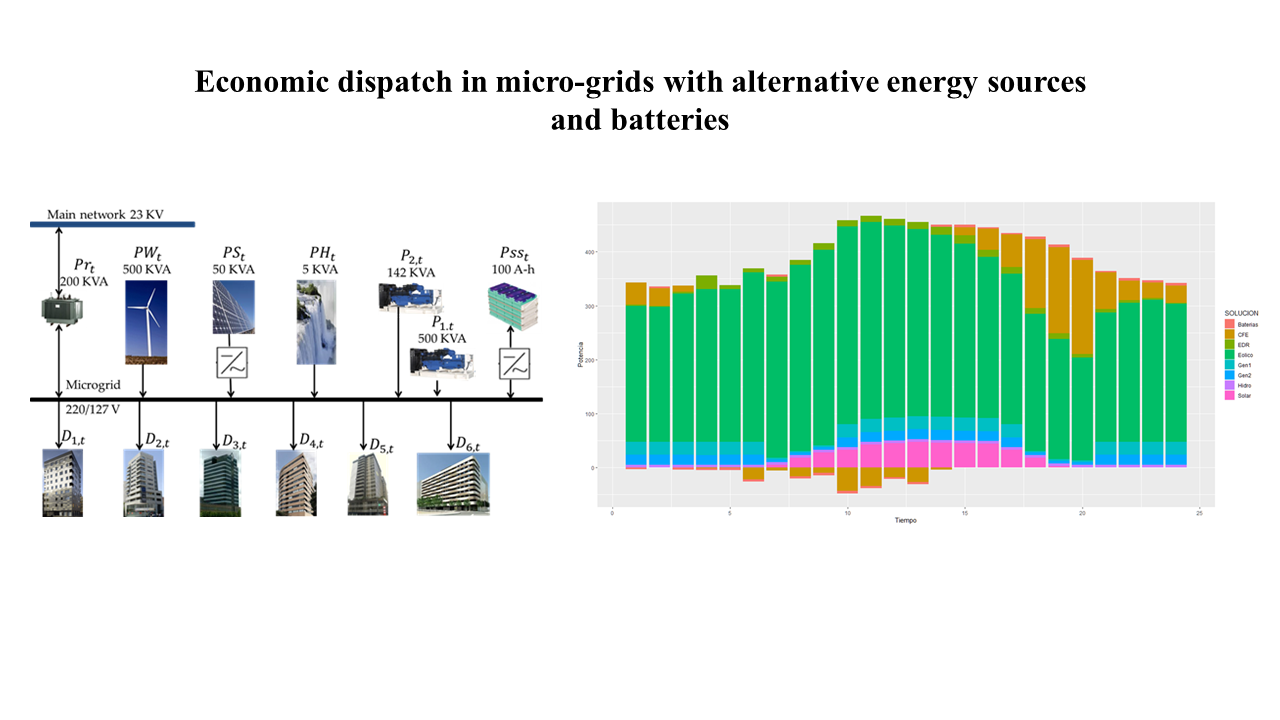Economic dispatch in micro-grids with alternative energy sources and batteries
Abstract
The problem of economic dispatch in a micro-grid interconnected to the conventional electrical system consists of optimizing the operating cost to satisfy the different operating requirements and the demand for electrical power required by the users. In the development of this proposal, there are challenges caused by the random nature of electricity generation systems based on renewable energy sources, for an adequate operation of the micro-grid, which can be solved through systems Energy Storage System (BESS). This paper addresses the problem of optimal economic dispatch in a microgrid that includes an energy storage system based on a battery bank and interconnected to the main grid through a mathematical programming approach, considering the benefits for customers by reducing their demand of electrical power and taking into account the costs of treatment pollutants produced by conventional energy sources. The generation systems used to satisfy the energy demand of the customers within the interconnected micro-grid are: a) conventional diesel generators, b) wind generation systems, c) photovoltaic systems, d) a hydroelectric turbine, and e) a storage system based on electric batteries. The results of the effectiveness of the proposed mathematical model show that the demand for electrical power to the main grid can be reduced and customers obtain economic benefits by integrating the incentive-based demand response program into the energy management problem when environmental contingency events occur. The results show that when there are peaks in energy demand, the operating costs of the micro-grid increase by up to 380%. In the same way, when there are failures in renewable energy sources, storage systems (BESS) and diesel generators work at 100% of their capacities. The proposal is implemented in Lingo 17.0 software and simulation results show the feasibility of the proposal through the optimization of the operation of the micro-grid.
Downloads
References
Y. Zhang, N. Gatsis and G. B. Giannakis, "Robust Energy Management for Microgrids With High-Penetration Renewables," IEEE Transactions on Sustainable Energy, vol. 4, pp. 944-953, Oct. 2013.
A. A. Khodadoost, G. B. Gharehpetian, M. Abedi, “Review on Energy Storage Systems Control Methods in Microgrids”, International Journal of Electrical Power and Energy Systems, vol. 107, pp. 745-757, May. 2019.
N.W.A. Lidula and A.D. Rajapakse, “Microgrids research: A review of experimental microgrids and test systems”, Renewable and Sustainable Energy Reviews, vol. 15, pp. 186-202, Jan. 2011.
N. I. Nwulu and X. Xia, “Optimal dispatch for a microgrid incorporating renewables and demand response”, Renewable Energy, vol. 101, pp. 16-28, Feb. 2017.
H. Karimi and S. Jadid, “Optimal energy management for multi-microgrid considering demand response programs: A stochastic multi-objective framework”, Energy, vol. 195, pp. 1-13 Mar. 2020.
V. Davatgaran, M. Saniei, S. S. Mortazavi, “Smart distribution system management considering electrical and thermal demand response of energy hubs”, Energy, vol. 169, pp. 38-49, Feb. 2019.
I. Strnad and D. Skrlec, "An approach to the optimal operation of the microgrid with renewable energy sources and energy storage systems," Eurocon 2013, Zagreb, Croatia. 2013. pp. 1135-1140.
A. Sashirekha, J. Pasupuleti, N. H. Moin, C.S. Tan, “Combined heat and power (CHP) economic dispatch solved using Lagrangian relaxation with surrogate subgradient multiplier updates”, International Journal of Electrical Power and Energy Systems, vol. 44, pp. 421-430, Jan. 2013.
F. Nazari-Heris, B. Mohammadi-ivatloo, D. Nazarpour, “Network constrained economic dispatch of renewable energy and CHP based microgrids”, International Journal of Electrical Power and Energy Systems, vol. 110, pp. 144-160, Sep. 2019.
L. Luo, S. S. Abdulkareem, A. Rezvani, M. Reza, S. Samad, Nahla Aljojo, M. Pazhoohesh, “Optimal scheduling of a renewable based microgrid considering photovoltaic system and battery energy storage under uncertainty”, Journal of Energy Storage, vol. 28, pp. 1-12, Apr. 2020.
W. Zheng, W. Wu, B. Zhang, H. Sun, Q. Guo and C. Lin, "Dynamic economic dispatch for microgrids: A fully distributed approach," 2016 IEEE/PES Transmission and Distribution Conference and Exposition, Dallas, TX, USA. 2016, pp. 1-3.
M. Ghahramani, M. Nazari-Heris, K. Zare, B. Mohammadi-Ivatloo, “Energy and reserve management of a smart distribution system by incorporating responsive-loads /battery/wind turbines considering uncertain parameters”, Energy, vol. 183, pp. 205-219, Sep. 2019.
L.Xiaoping, D. Ming, H. Jianghong, H. Pingping, P. Yali, “Dynamic Economic Dispatch for Microgrids Including Battery Energy Storage”, The 2nd International Symposium on Power Electronics for Distributed Generation Systems. Hefei, China. 2010. pp. 914-917.
S. Jayashree and K. Malarvizhi, “Methodologies for Optimal Sizing of Battery Energy Storage in Microgrids: A Comprehensive Review”, 2020 International Conference on Computer Communication and Informatics (ICCCI), Coimbatore, TN., India. 2020. pp. 1-5.
F.D. Santillán-Lemus, H. Minor-Popocatl, O. Aguilar-Mejía, R. Tapia-Olvera, "Optimal Economic Dispatch in Microgrids with Renewable Energy" Energies 2019, 12, 181.
R.B. Franca, E.C. Jones, C.N. Richards, J.P. Carlson, "Multi-objective stochastic supply chain modeling to evaluate tradeoffs between profit and quality" Int. J. Prod. Econ. 2010, 127, pp. 292–299.


